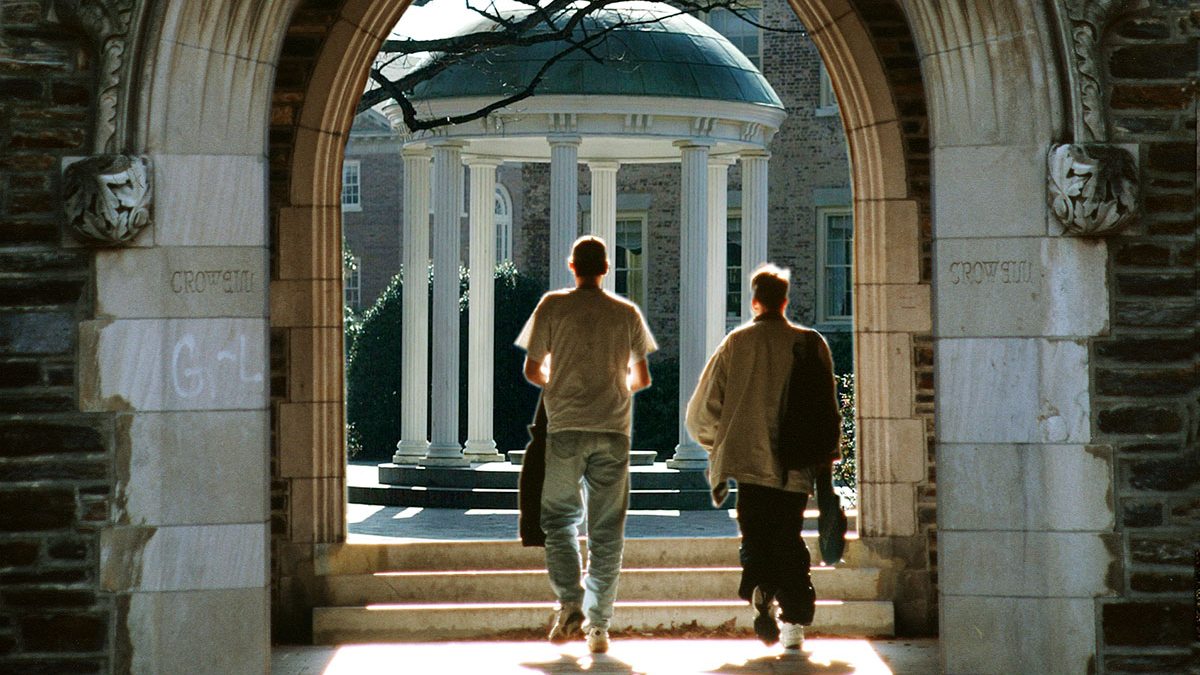Partners in leadership
Launched in 2000, the Robertson Scholars Leadership Program helps Carolina and Duke students reach their full leadership potential through year-round programming and the opportunity for students to take courses at the other campus.

On the basketball court, there’s little love lost between Carolina and Duke University.
But for two decades, the two universities have teamed up for a bigger mission: developing tomorrow’s leaders out of today’s Tar Heels and Blue Devils.
Launched in 2000, the Robertson Scholars Leadership Program helps Carolina and Duke students reach their full potential through year-round development and leadership programming. To build community, the program also requires students to take courses at both campuses.
“Our goal is to develop leaders who will make a transformational impact on society and communities,” said Allen Chan, the program’s executive director. “We’re looking for the students with the highest absolute potential for leadership, and what we’re trying to do is put them through a program that unlocks that potential and changes it from potential to kinetic leadership.”
The unique scholarship program provides full tuition, room and board, and fees for four years of undergraduate study. It also provides three summers of domestic and international experiences that challenge the students to learn more about themselves and the world.
Creating leaders
While Robertson Scholars take classes at both campuses, they live at one campus, either in Chapel Hill or Durham. Then, during their sophomore year, they live one semester at the other university. The campus switch is meant to challenge the scholars to engage in a new environment and develop their abilities to be adaptive, resourceful and collaborative.
The core of the Robertson Scholarship’s mission is to help the students develop their leadership traits early in their careers to maximize their ability to impact their communities positively.
Since scholars come from a variety of majors, Chan knows that leadership doesn’t mean the same thing for every student. Instead, the program gives students the tools and experiences to develop their own leadership style.
“Leadership is hard to define,” Chan said. “Leadership is used everywhere, and yet there’s no one definition. What we’re trying to do is focus on the person and develop their potential as a leader. We don’t want to pre-describe where leadership happens. We just know that as a society, we need leaders in every field.”
Whether it’s through a summer internship in Tarboro, North Carolina, or a full semester living on the other campus, the program aims to push students outside their comfort zones. That, Chan said, is where leadership growth happens.
“Leadership comes from instability, not stability,” he said. “That’s our mantra.”
A Duke-Carolina connection
Julian Robertson ’55, and his wife, Josie, funded the program based on the belief that each institution offers a distinctive undergraduate experience, but that the combination of the two promises a breadth of resources that no other university could match.
That partnership, and the ability to study at both campuses, is what attracted Carolina sophomore De’Ivyion Drew to the program.
“I was hoping to explore and synthesize topics that involve my leadership in depths and brevity that can only be found with UNC-Chapel Hill and Duke University together,” said Drew, who is majoring in art sculpture and African, African American and Diaspora Studies.
A semester across town
For Carolina senior Priya Sridhar, studying at Duke University helped her learn to connect and relate with a variety of people.
“Leadership development just happened in a way that I couldn’t conceptualize coming into the program,” she said. “Living at Duke for a semester really pulled me out of my comfort zone.”
Her semester at Duke also led to her finding one of her passions. A public policy major at Carolina, she enrolled in global health courses at Duke. When she graduates in the spring, she’ll have a major from UNC-Chapel Hill and a minor in global health and a certificate from Duke.
Duke junior Joseph Touma had a similar experience during his semester at Carolina, getting to study topics that aren’t available for undergraduates in Durham.
“While UNC-Chapel Hill is just down the road, the campus experience is quite different than that at Duke,” he said. “The ability to take undergraduate classes at the Kenan-Flagler School of Business was especially unique, as undergrads don’t have access to the business school at Duke. In addition to the class I took at Kenan-Flagler, one class especially stood out — Authoritarian Politics with professor Cameron Ballard-Rosa. Ballard-Rosa’s passion and interest in the subject made the coursework captivating, and much of what I learned in that course has informed my future studies in politics back at Duke.”
While the opportunity to study at the different school has a clear academic benefit for the students, Chan said he wants students to learn just as much outside the classroom.
“It’s just like when you go to different countries as a tourist and just pop in and pop out. You don’t really get a sense of the true culture,” Chan said. “We want these scholars to come away and have a true love for both universities. Living there for a full semester allows them to really understand the ins and outs, and really understand and become a part of the other culture.”
But during the basketball season, the rivalry remains enforced by many of the scholars.
“It definitely adds some extra energy to the program. Robertson Scholars are especially proud of their home campus, yet we all have to change sides during campus switch,” Touma said. “It certainly adds an interesting element to the social dynamic, though in my experience, all of it is in good fun.”




